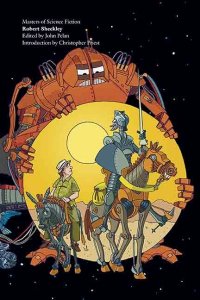Paul Di Filippo Reviews Masters of Science Fiction: Robert Sheckley by Robert Sheckley
 Masters of Science Fiction: Robert Sheckley, Robert Sheckley (Centipede Press 978-1-61347-311-5, hardcover, 728pp, $65 February 2022.
Masters of Science Fiction: Robert Sheckley, Robert Sheckley (Centipede Press 978-1-61347-311-5, hardcover, 728pp, $65 February 2022.
There have been four previous volumes in Centipede Press’s gorgeous series Masters of Science Fiction. (Lordy, how splendidly assembled and adorned these books are!) The dedicatees are: James Patrick Kelly, Fritz Leiber, Richard Wilson, and Kate Wilhelm. I endorse these selections wholeheartedly. (I even did the introduction to the Wilson volume.) True masters, one and all. But I will also note that these names might not be the first ones to spring to the tongues of less-well-read fans when queried, “Who deserves the title ‘Master of Science Fiction?’” So in some small sense at least, these books are a recuperative effort to gain for these somewhat overlooked authors a greater esteem than they currently enjoy.
In Sheckley’s case, as with the other departed Masters (Kelly, of course, is still hustling for himself and justifying his status with new work), the selections here convey a magisterial reach and grasp of what makes a wonderful science fiction story at master levels. Not only will you experience tons of sheer reading pleasure, you’ll get insights into the history of the genre and its parameters and possibilities.
During the 1960s, in my tender youth, I cut my milk teeth on Sheckley, snatching up every paperback collection of his that I could. He was a big influence and delight, and my novel Fuzzy Dice is an homage to his Dimension of Miracles. Along with William Tenn and a handful of other like-minded writers (Ron Goulart prominently), he defined and ruled the sub-genre of humorous, absurdist, satirical SF. One can see why Kingsley Amis once assigned him top status among all SF authors. But I had not read him in decades, and so approached this volume trepidatiously. I need not have worried. These stories prove themselves to be eternal, just as wry and funny and wicked now as they were at their origins.
There are almost three dozen, from the 1950s, 1960s, 1970s, 1980s, 1990s and 2000s. (Sheckley died in 2005.) A couple of my faves, such as “Cordle to Onion to Carrot”, are missing, but it’s hard to include every story from a long career of so much greatness, even in a volume of this size.
Let’s take a look at a couple from each decade, to see if we can derive some useful insights.
In the Fifties Sheckley’s fiction—full of weird aliens, warped robots, naïve souls, and predatory con men—hewed to conventional narrative structures and displayed a contrarian, mordant, satirical bent. He was intent on using his keen discernment and sense of the absurd to pick apart all the verities of Eisenhowerian America. “Watchbird”, about protective robots that turn killer, plumbs the depths of the military-industrial complex in a fresh way that, say, older Jack Williamson could not do. Meanwhile “A Ticket To Tranai” takes the kind of then-prevalent Sturgeonesque concern with utopias and inverts all the idealism and optimistic beliefs in the goodness of human nature to produce a crazy society whose unique madness mirrors ours. Other tales of this decade such as the famous “Seventh Victim” (legalized hunting of humans) continue to dissect conventional mores and beliefs. This period represented some kind of apex for Sheckley’s fiction, albeit perhaps in a slick, Twilight Zone fashion.
Just like the culture at large, for Sheckley the Sixties were divided in half. The stories from early in the decade retain a whiff of the Fifties, with an undercurrent of new concepts. But then, always tuned in to elements of beatnik Buddhist bohemianism, Sheckley went full-bore hippie, to some degree, producing almost Yippie-like tales, full of surrealism and absurdism. “Can You Feel Anything When I Do This?” with its Casanova vacuum cleaner is typical. And there’s a definite Mel Brooks/Woody Allen flavor to the nagging intelligent city in “Street of Dreams, Feet of Clay”.
The Seventies seemed for Sheckley, as for so many people, an era of trying to reconcile the tumult of the past and find new certainties. Thus a very Asimovian tale like “The Cruel Equations”, in which an overly obedient robot nearly kills a man, seems to be deliberately nostalgic. But then we have the later “What Is Life?” which is almost a New Age vignette, as a traveler is hailed by a sourceless voice seeking metaphysical answers.
The Eighties and Nineties strike me as the period when Sheckley went Meta. He began to deconstruct the very notion of science fiction and narrative story telling. Stories like “Dramocles” and “Minotaur Maze” deconstruct, respectively, space opera and heroic fantasy, breaking down the Fourth Wall and juggling tropes and riffs as if they were chainsaws.
Finally, in the last decade of his life, Sheckley seems to me to have resolved any inner conflicts and artistic conundrums, acquiring, if it’s not too much of a cliché, wisdom and peace. In “Magic, Maples and Maryanne”, the protagonist, like Prospero, abandons his magic for domestic comfort (not without some savage indictments of greed). “The Quijote Robot” charts the cost of hewing to idealism (such as being an underpaid SF writer). And “The Two Sheckleys” is a Borgesian self-assessment. “At the beginning of his career he had possessed a considerable Central Posterior Imago, a structure that develops in some individuals shortly after puberty… Due to his possession of this, the making of imaginative worlds had become almost second nature for him. But in recent years, that subamygdalic organ had begun to shrink and atrophy, thus leaving him at a disadvantage in the making of his confections.” Rueful and sad self-wisdom.
Not arrayed chronologically, the contents of this essential, impressive volume allow the reader to flit back and forth across all the eras of Sheckley’s life until finally a composite portrait emerges of a supremely talented fellow full of wit and pained sensitivity, whose outlook on life and science fiction were unduplicatable. Entirely capable of writing pure straight adventures—many of his stories feature much suspense and action—Sheckley could not resist using a stick to poke his bloated, unthinking, lazy and hypocritical fellow citizens in a manner that forced us to acknowledge our follies and laugh at them.
This review and more like it in the May 2022 issue of Locus.
While you are here, please take a moment to support Locus with a one-time or recurring donation. We rely on reader donations to keep the magazine and site going, and would like to keep the site paywall free, but WE NEED YOUR FINANCIAL SUPPORT to continue quality coverage of the science fiction and fantasy field.
©Locus Magazine. Copyrighted material may not be republished without permission of LSFF.







